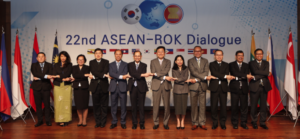Seoul ã Senior Officials of ASEAN and the Republic of Korea (ROK) participating in the 22nd ASEAN-ROK Dialogue on 21 June in Seoul reaffirmed the importance of the ASEAN-ROK Strategic Partnership and renewed commitment to forge closer ties.
The senior officials also discussed regional and international issues of common interest and concern and agreed to work together to address emerging challenges and promote peace and stability.
The meeting welcomed the progress of ASEAN-ROK cooperation over the past one year including the positive outcomes of the Leadersã Meeting last November. Both sides agreed to work closely to ensure the effective implementation of the Plan of Action 2016-2020. ASEAN Member States welcomed the New Southern Policy initiated by President Moon Jae-in last year to further strengthen and deepen the ROKãs relations with ASEAN.
Both sides also noted that 2019 will mark the 30th Anniversary of ASEAN-ROK Dialogue Relations which will add momentum to advancing the partnership, and looked forward to activities to commemorate this milestone.
Trade and investment ties continue to grow as Korea remains the fifth largest trading and Foreign Direct Investment partner of ASEAN, and the two sides are intensifying efforts to reach the two-way trade target of US$200 billion by 2020, from $52 billion in 2017. These include further liberalization of products under the ASEAN-ROK Free Trade Area and enabling greater role and contribution of Micro, Small and Medium Enterprises (MSMEs) including through various platforms such as the ASEAN-Korea Business Council.
Substantive progress has also been made in other areas of cooperation such as agriculture, food and energy security, environment, health, and science and technology. ASEAN and the ROK have been actively collaborating in addressing climate change and disaster management and cooperation in this area will be further strengthened with the establishment of the Asian Forest Cooperation Organisation in April this year.
People-to-people exchange remains a priority following the successful launch of the ASEAN-ROK Cultural Exchange Year in 2017. In addition to the ASEAN-ROK Centre which has been in operation since in 2009, the ASEAN Culture House launched last September in Busan will serve as a ãlively platformã to boost cultural ties and understanding of ASEAN culture in the ROK. The closeness in people-to-people ties is manifested with the increasing number of visitors to each side which reached 9.5 million last year.
ASEAN welcomed the ROKãs continued support for ASEAN Community-building efforts particularly in enhancing regional connectivity and narrowing development gap including through its support for the Initiative for ASEAN Integration Work Plan III and sub-regional development such as the Mekong-ROK framework.
The meeting also welcomed the ROKãs support for priorities of ASEAN to strengthen resilience and innovation, including the ASEAN Smart Cities Network to be established later this year.
The senior officials also exchanged views on matters related to regional peace and security. The dialogue on security-related issues was wide-ranging and extensive. Both sides welcomed the recent developments in the Korean Peninsula including the two Inter-Korean Summits over the last two months and the United States-Democratic Peopleãs Republic of Korea Summit on 12 June 2018 in Singapore.
ASEAN and the ROK looked forward to the full implementation of the outcomes of these Summits to lay the groundwork to establish a lasting and stable peace regime and complete denuclearization of the Korean Peninsula. They emphasized the importance of maintaining peace, stability, freedom and safety of navigation in and over-flight above the South China Sea, as well as support for ASEANãs ongoing efforts to realize full and effective implementation of the Declaration on the Conduct of Parties in the South China Sea and early conclusion of the Code of Conduct. Furthermore, both sides agreed to strengthen cooperation to jointly address emerging non-traditional security challenges, particularly transnational crimes including terrorism and cybercrime.

